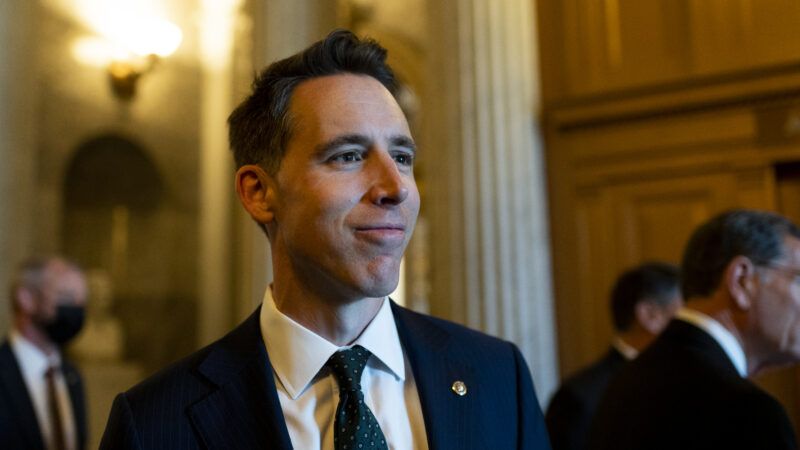Politics Has Too Much Posturing and Not Enough Problem-Solving
During a speech to a conservative group this month, Hawley depicted a decline in masculinity as one of the nation's foremost problems. Really?

As someone who tries to evaluate specific public policies based on their merits and adherence to my long-held libertarian philosophy, I've been increasingly dispirited by the crazy partisanship that has consumed our political debates. These days, we're supposed to simply pick a team and cheer as it runs up the score on the other team.
"Don't you know that politics is binary?" conservative friends would ask whenever I criticized some misbegotten Trump administration policy (e.g., tariffs). In their view, Republicans always are better on balance than the Democrats, so I need to join their side and fight—even when they promote idiocy. To partisans, it's always about winning the next election.
When I call balls and strikes—those Supreme Court justice nominations are great, but trying to steal an election endangers our democracy—I'm apparently a sellout. Even though I routinely criticize California's Democratic politicians, I'm thrilled on the rare instances that they advance sensible ideas—such as when Gavin Newsom signed a package of long-overdue police reforms.
The end goal is good public policy, and it shouldn't matter who champions it. But when we view politics as a grudge match, we lose our leverage to change the way that "our" allies operate. Perhaps holding both Republicans and Democrats accountable for routinely violating their stated principles might push them to reconsider the positions they take. Well, hope springs eternal.
Writing about Democratic responses to the acquittal of Kyle Rittenhouse in the Kenosha, Wis., shootings and a police shooting in the city, The Bulwark's Charlie Sykes complained about "The tyranny of ideological narratives." That's a crucial observation. Indeed, both sides jump to tribe-based conclusions about specific events and their hot takes always are so banal and predictable.
Yet when everything is hardened ideologically, we lose the ability to make nuanced distinctions. We can never even agree on the basic facts of any given situation (even if it's caught on video) and end up advancing morally dubious and even clownish positions.
This self-imposed ideological tyranny leads politicians to spend their time posturing rather than governing. They mainly try to energize their base. They eschew reasonable ideas but seek only to heighten the partisan anger. Few politicians do this more consistently than the populist Republican Sen. Josh Hawley (R–Mo.).
During a speech to a conservative group this month, Hawley depicted a decline in masculinity as one of the nation's foremost problems. "I want to focus tonight on the deconstruction of men, not because men are more important, but because I believe the attack on men has been the tip of the spear of the Left's broader attack on America. And because this attack on men is already far advanced," he said.
The populist right has long had a weird, almost adolescent view of manliness. Men are half the population and some of them always have struggled with something, so it's goofy to depict us as the targets of some orchestrated attack. The politics of victimization, whether it comes from conservatives or liberals, has become so tiresome.
There's a legitimate argument that, say, a rapidly changing economy, a government-run educational system that sees college (rather than trades) as the one-size-fits-all approach and the spread of government-assistance programs, has led many men into a life of idleness, substance abuse, and despair. That pox has devastated some poor and working-class communities.
But instead of addressing a cultural/economic problem that's been analyzed for decades, Hawley is using it to bludgeon his opponents and accuse them of attacking half the population. He takes a serious societal conundrum and turns it into a political battle cry rather than a search for practical solutions.
Of course, leftists aren't looking for solutions to any problem beyond their go-to answer of increasing government spending. When that spending leads to an easily predictable and painful bout of inflation, they stick to their usual ideological narratives. First, they told us there is no real inflation, then they cast blame on everything other than their own policies.
Now, with oil prices up 59 percent, meat and poultry prices up 12 percent, and overall inflation up 6.3 percent, they can't ignore reality. They tell us that inflation actually isn't such a bad thing. "It's the predictable product of the economy's rapid recovery, and its cost has been offset, to a large degree, by robust wage growth and government policies," argued MSNBC columnist James Surowiecki.
We obviously can't address an inflation crisis if we're arguing that the erosion of Americans' savings and their inability to buy homes and cars actually isn't that big of a deal. But that's what happens when politics becomes totally binary. The "inflation is OK" crowd would no doubt make the opposite argument if the GOP team were in power.
There's not much we can do other than commit ourselves to viewing the world more as a referee and less like a cheerleader.
This column was first published in The Orange County Register.


Show Comments (241)